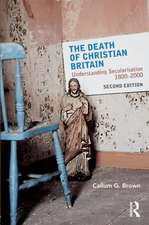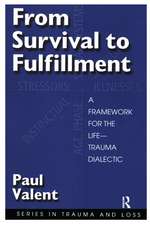Beyond Invisible Walls: The Psychological Legacy of Soviet Trauma, East European Therapists and Their Patients: Series in Trauma and Loss
Editat de Jacob D. Lindy, Robert Jay Liftonen Limba Engleză Paperback – 19 mar 2014
| Toate formatele și edițiile | Preț | Express |
|---|---|---|
| Paperback (1) | 455.50 lei 6-8 săpt. | |
| Taylor & Francis – 19 mar 2014 | 455.50 lei 6-8 săpt. | |
| Hardback (1) | 1356.46 lei 6-8 săpt. | |
| Taylor & Francis – 2 noi 2001 | 1356.46 lei 6-8 săpt. |
Preț: 455.50 lei
Preț vechi: 479.47 lei
-5% Nou
Puncte Express: 683
Preț estimativ în valută:
87.17€ • 90.45$ • 72.86£
87.17€ • 90.45$ • 72.86£
Carte tipărită la comandă
Livrare economică 15-29 martie
Preluare comenzi: 021 569.72.76
Specificații
ISBN-13: 9781138011953
ISBN-10: 1138011959
Pagini: 270
Dimensiuni: 152 x 229 x 15 mm
Greutate: 0.39 kg
Ediția:1
Editura: Taylor & Francis
Colecția Routledge
Seria Series in Trauma and Loss
Locul publicării:Oxford, United Kingdom
ISBN-10: 1138011959
Pagini: 270
Dimensiuni: 152 x 229 x 15 mm
Greutate: 0.39 kg
Ediția:1
Editura: Taylor & Francis
Colecția Routledge
Seria Series in Trauma and Loss
Locul publicării:Oxford, United Kingdom
Cuprins
Contributors, Acknowledgments, Preface, 1. Editors' Introduction, 2. Legacy of Trauma and Loss, 3. Hungary: Replacing a Missing Stone, 4. German Democratic Republic: Absorbing the Sins of the Fathers, 5. Romania: A Time of Yielding, 6. Russia: An Emptiness Within, 7. Croatia: Old Scars, New Wounds, 8. Armenia: Aftershocks, 9. Invisible Walls, 10. History as Trauma, Afterword, Glossary, References, Index
Notă biografică
Jacob D. Lindy, MD, is Training and Supervising Analyst and past Director of the Cincinnati Psychoanalytic Institute in Cincinnati, Ohio. He is also co-director of the University of Cincinnati Traumatic Stress Study Center and guest teacher at institutes in Moscow and St. Petersburg, Russia. Robert Jay Lifton, MD, is a leader in the study of trauma and history in the twentieth century and the author of numerous books on the psychological dimension of historical events. He is in the Department of Psychiatry at Harvard Medical School.
Recenzii
"Beyond Invisible Walls is a stunning, groundbreaking accomplishment. Lindy and Lifton, two pioneers in the field of traumatic stress research, have blended clinical insights into the ways in which totalitarian nation states create trauma to manipulate individuals, cultures, and intergenerational patterns of communication. This brilliant book pushes the envelope of understanding psychological trauma and post-traumatic effects to society. It develops new conceptual paradigms of trauma, psychotherapy, and psychohistory. This book will be a classic and is a 'must read'." -- John P. Wilson, Ph.D., Professor of Psychology, Cleveland State University, and Past-President, International Society for Traumatic Stress Studies
"Beyond Invisible Walls: The Psychological Legacy of Soviet Trauma, Eastern European Therapists and Their Patients, is a huge book, many times larger than its 251 pages. It raises a multitude of issues, such as the effects of trauma and loss, the role of the outer world in the development of self, the correspondents of the analysts, and patients, experience, and the resilience of the human being subject to the most extreme conditions. The reader does not expect any final resolution but is left deeply appreciative of the attempts and hungry for more. Clearly, this book is not a final product. One fervently hopes that it will be widely read and a beginning." -- The American Journal of Psychoanalysis
"The editors went through a commendable effort to locate Eastern European practitioners and recover their voices. This psychohistorical approach is an exemplary attempt to do "history from below" by linking individual biographies to political culture. The various contributions deal with such diverse aspects as the links between childrearing practices, pathology, and the political system, and the effect of dislocation, war, and torture on individual patients. Some of the chapters (especially the chapter on Romania) can be harrowing reading, attesting to the grossest of human rights abuses." -- Journal of History of the Behavioral Sciences, Spring 2003
"Beyond Invisible Walls: The Psychological Legacy of Soviet Trauma, Eastern European Therapists and Their Patients, is a huge book, many times larger than its 251 pages. It raises a multitude of issues, such as the effects of trauma and loss, the role of the outer world in the development of self, the correspondents of the analysts, and patients, experience, and the resilience of the human being subject to the most extreme conditions. The reader does not expect any final resolution but is left deeply appreciative of the attempts and hungry for more. Clearly, this book is not a final product. One fervently hopes that it will be widely read and a beginning." -- The American Journal of Psychoanalysis
"The editors went through a commendable effort to locate Eastern European practitioners and recover their voices. This psychohistorical approach is an exemplary attempt to do "history from below" by linking individual biographies to political culture. The various contributions deal with such diverse aspects as the links between childrearing practices, pathology, and the political system, and the effect of dislocation, war, and torture on individual patients. Some of the chapters (especially the chapter on Romania) can be harrowing reading, attesting to the grossest of human rights abuses." -- Journal of History of the Behavioral Sciences, Spring 2003
Descriere
When the Berlin Wall fell in 1989, Westerners watched those who had survived the era of Soviet trauma emerge into what we hoped would be the exhilarating light of freedom. What we have witnessed, however, is a slow and painful process of progression and regression: invisible walls that block the progress we had hoped for.

























